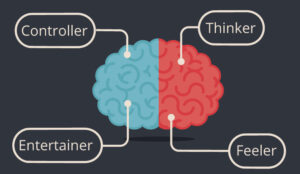It’s a simple concept. Not all customers are the same. So, if you want to improve customer service you need to start treating different customers differently.
Jill Dean highlights how personality profiles are used by companies, such as the award-winning British Gas, as a way of delivering different styles of customer service.
The power of personality
Customers certainly won’t change to make your life easier, but you can change the way you interact with them.
That’s the basis of the approach you can use to transform the customer experience.
We begin by identifying what we refer to as the four personality ‘drivers’. While, on a day-to-day basis, individuals will react to situations in different ways driven by some or all of them, it is likely that there will be one ‘driver’ that is more dominant. This primary ‘driver’ will colour the way that people behave in the majority of situations and is likely to be the major determinant of how people are perceived by others.
Four different personality profiles
The best way to understand each one is to consider how they’re perceived at their best (on a good day when all’s running to plan) and worst.
- Feeler: Considerate, loyal and sincere, which could be seen as indecisive and over-involved at times.
- Entertainer: Charismatic, optimistic and humorous, which could sometimes come across as self-centred and sarcastic.
- Controller: Business-like, direct, decisive, but could be seen as dictatorial and intimidating.
- Thinker: Logical, detailed and calm, seen by some as unimaginative and stubborn.
Recognise and relate
When we introduce our clients to this insight for the first time, we aim to achieve two things: self-realisation and mutual understanding of others. Without the former, the latter’s not possible. It’s only when a mirror’s held up to your own behaviour that you can begin to understand how others see you, and appreciate just how differently you perceive things.

British Gas display the advisor’s personality profile on their desks
Dealing with different drivers
By understanding the qualities of the other ‘drivers’, it’s possible to identify wants, needs, similarities, differences and where there might be potential conflict. This helps us to drill down into what each customer wants from customer service.
All customers want advisors to take ownership of the query, listen to them and do what they promise, but it’s the way that advisors tackle these that’s most important to each individual’s experience.
But how do you spot which ‘driver’ each caller is likely to be?
Here are a few pointers on what they might say, and how to tailor your approach to the different ‘drivers’:
1. Feelers
The best way to communicate with a feeler is to be friendly and fair. A Feeler might begin a complaint by saying how upset they are or by saying how a fault on the company’s part has affected them, their family or friends.
The best way to serve them, particularly if you’re a Controller whose first instinct is to resolve the call quickly, is to show some understanding and offer moral as well as material support. Often all they want is to be treated fairly.
A Thinker, by contrast, could find common ground with a Feeler by giving them space to explain their personal experience.
- They say: “My daughter’s so disappointed. Everything was supposed to be ready and wrapped for her birthday.”
- You say: “I’m really sorry that this has made life difficult. I’ll personally look into that for you.”
- Don’t say: “So your point is…?”
2. Entertainers
An Entertainer is likely to start their call with a light-hearted chat about… well, whatever’s on their mind at that precise moment – most likely, themselves! You should engage with them and sound interested in what they’re saying.
A Thinker taking their call would probably be more inclined to get an in-depth understanding of their issue rather than make small talk.
However, humour them – responding to the caller’s need for ‘banter’ and reassurance they’re dealing with a real person will increase rapport. A Controller dealing with this type of customer should avoid pushing the caller to ‘get to the point’…
- They say: “New Year was amazing! Glad I’ve got the next few days off to recover.”
- You say: “Sounds like a blast! Seeing as you’ll be at home for the next couple of days, I’ll see if we can squeeze in that delivery for you…”
- Don’t say: “I’m struggling to understand the precise nature of your enquiry.”
3. Controllers
Controllers are likely to be (very) direct, and get to the point as quickly as possible. They give, and like to receive, short, sharp soundbites of information.
They value proactivity, solutions and options. When dealing with them, make sure you get right to the point and, even if you don’t know an answer, tell them you’ll find out. Thinkers, please spare them the detail. Feelers, don’t take their brusque manner as aggression directed at you.
- They say: “I need the package on Monday.”
- You say: “The quickest solution is to book the delivery in ASAP. That way there’s a better chance you’ll get the package on Monday morning, weather permitting. Would you like me to sort that out for you now?”
- Don’t say: “It’s possible, but it all depends when the courier gets to you. I’ve heard snow’s on its way, so don’t hold your breath. I don’t know the exact time. Probably Monday in the early afternoon, but don’t quote me on that.”
4. Thinkers
A Thinker is almost certain to offer an in-depth account of their issue. When dealing with them you should make sure you take on board everything they’re saying and have all the information you need to deal with their questions – tell them all the details.
And yes, there will be questions, so don’t rush them! Give them space to absorb, analyse and ensure you explain the nitty-gritty. Controllers, try not to get frustrated. Entertainers, don’t make light of their queries.
- They say: “Just so I understand, can you run through what happens now?”
- You say: “To summarise: you’re scheduled to receive your order within three working days of placing it. You’ll get email confirmation when it’s been dispatched. In the event that there’s any delay in shipping we’ll advise you of an alternative dispatch date as soon as we can.”
- Don’t say: “Don’t worry. You’ll get your order.”
Get some perspective

Jill Dean
One size never fits all, especially where customers are concerned. However, by adopting an approach (such as the one outlined above) that’s designed to be more inclusive of their different needs, advisors can and will deliver a much more positive experience.
Even when customers don’t get exactly what they want from a call, if they feel they’ve been listened to, that the advisor’s understood where they’re coming from, and done everything possible, they’ll look upon your business in a favourable light.
Companies operating across a number of diverse sectors – utilities, finance, automotive, travel and transport – have successfully used this approach to behavioural change to achieve immediate, yet lasting, results and measurable return on investment.
Our clients have seen increases in employee engagement, net promoter scores and first time call resolutions, as well as significant reductions in average call times.
Jill Dean, Former Chief Executive Officer of Brand Biology
Which personality profile are you?
How can you find out which personality profile you are? Our approach is a quick test to illustrate how each would respond to a given situation.
Consider the following scenario: An irate customer calls to find out when their delivery’s coming as it didn’t arrive this morning as scheduled.
What’s your natural instinct?
a) Respond to their anger by apologising, hoping they’ll calm down.
b) Try to get to the bottom of the problem. You want to understand why this has happened before you consider what to do next.
c) Let them get their rant over, then do what you can to lighten the mood.
d) Tell them to calm down. It’s not your fault.
If (a) then chances are you’re a Feeler, if (b) you’re likely to be a Thinker. If (c) is your answer, you’re probably an Entertainer, and if (d) you’re more than likely to be a Controller.
For more on the topic of personalising customer interactions, read our articles:
- How to Personalise Customer Interactions
- 6 Ideas for a Great Personalized Customer Experience
- 26 Tips to Personalise Customer Experience
Author: Guest Author
Reviewed by: Megan Jones
Published On: 30th Jan 2013 - Last modified: 11th Sep 2024
Read more about - Customer Service Strategy, Personalization















